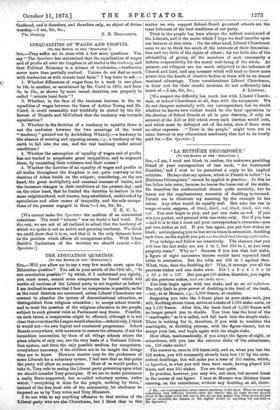THE EDUCATION QUESTION.
[TO THE EDITOR OF THE "SPECTATOR."]
you allow me to say a very few words more upon the Education question? You ask in your article of the 13th ult., "Is mot concilation possible ?" by which, if I understand you rightly, you must mean, cannot some compromise be found which will enable all sections of the Liberal party to act together as before?
am inclined to answer that I fear no compromise is possible, as far as the rural districts are concerned, unless Liberal Churchmen are ,content to abandon the system of denominational education, as 'distinguished from religious education ; to accept school boards ; and to trust the question of the religious education to the people, subject to such general rules as Parliament may frame. Possibly, -on such terms, a compromise might be effected, although it is not -clear that even then the League would abandon—definitively, I think it would not—its own logical and consistent programme. School Boards everywhere, with measures to ensure the ultimate, if not the immediate annexation by them of all village schools where the place admits of only one, are the very basis of a National Educa- tion system, and form the only possible medium for compulsion, -everywhere necessary, if the children are to be taught the things they are to know. However sincere may be the preference of -some Liberals for a voluntary system, I feel sure that on this point the party will allow no compromise. Most of us would prefer, I take it, Tory rule to seeing the Liberal party governing upon what we should consider Tory principles. If we are to make permanent -a really State-supported, but so-called voluntary system, under which " everything is done for the people, nothing by them," -instead of the free local rule of the community, let obedience be imposed on us by Tory votes and Tory Ministers.
I do not wish to say anything offensive to that section of the Liberal party who are also Churchmen, but I think that in this
The Oratory. J. B. DALGAIRNS. Trust in the people has been always the noblest watchword of the Liberals, and is the motto which I hope we shall inscribe upon our banners at this crisis. On the other hand, Liberal Churchmen seem to me to think too much of the interests of their denomina- tion and too little of the rights of others ; far too little also of the advisability of giving all the members of each community a definite responsibility for the moral well-being of the whole. At present, our villagers are too much subjected to the influence of Church and land, and any measure which will tend to throw more power into the hands of elective bodies in them will be an almost unmixed advantage. These considerations Liberal Churchmen, in their zeal for their creed's interests, do not sufficiently take
[We suspect the difficulty lies much less with Liberal Church- men, or indeed Churchmen at all, than with the ratepayers. We do not disagree materially with our correspondent, but we doubt whether he knows how violent would be the local opposition to the election of School Boards at all in poor districts, if only on account of the £50 or £60 which every such election would cost, and which must be defrayed out of the rates, even if there were no other expenses. "Trust in the people" might turn out to mean distrust in any educational machinery that had to be locally paid for.—En. Spectator.]


































 Previous page
Previous page